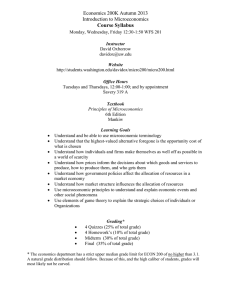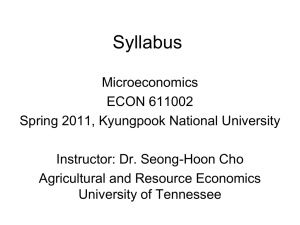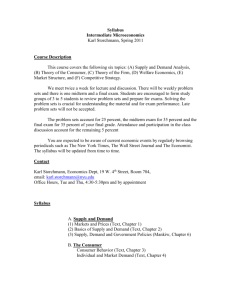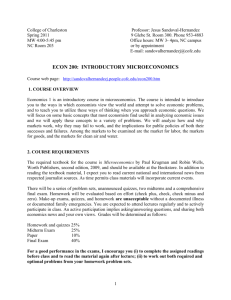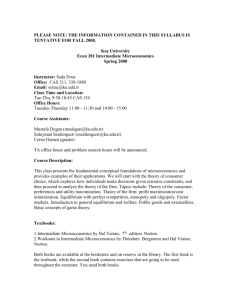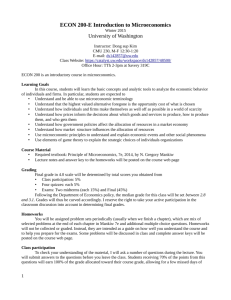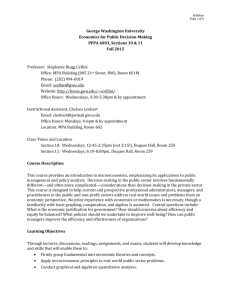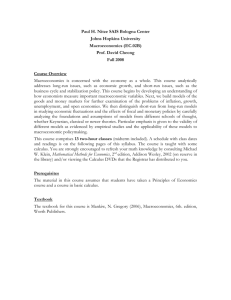Syllabus for Econ 201, Fall 2006 - WVU College of Business and
advertisement
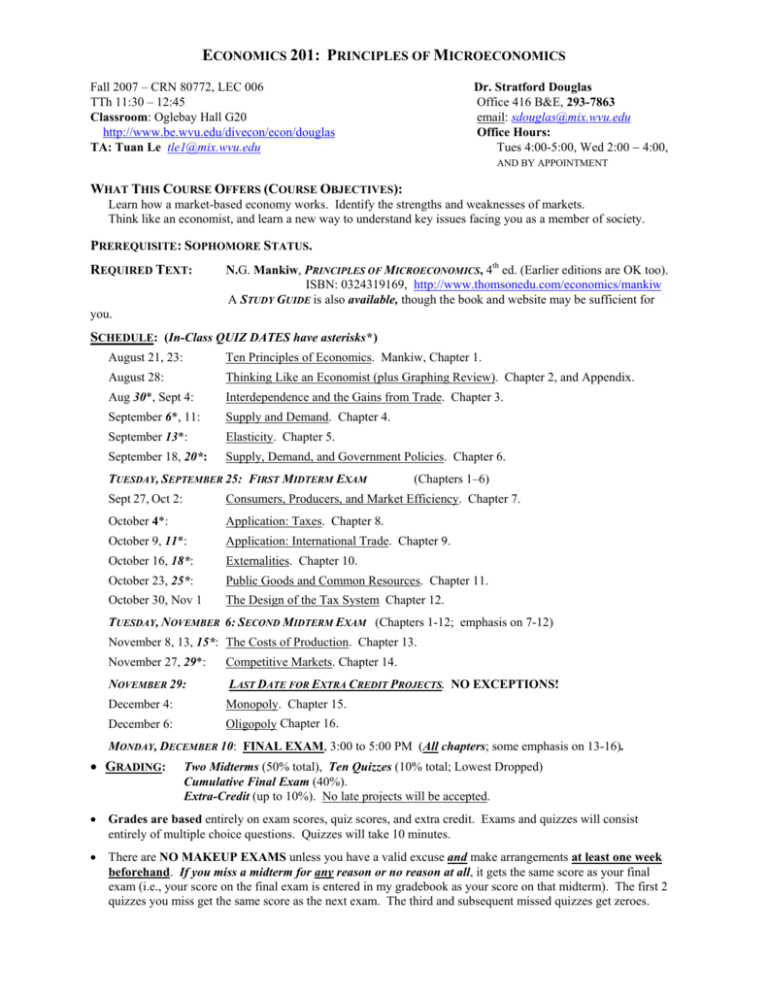
ECONOMICS 201: PRINCIPLES OF MICROECONOMICS Fall 2007 – CRN 80772, LEC 006 TTh 11:30 – 12:45 Classroom: Oglebay Hall G20 http://www.be.wvu.edu/divecon/econ/douglas TA: Tuan Le tle1@mix.wvu.edu Dr. Stratford Douglas Office 416 B&E, 293-7863 email: sdouglas@mix.wvu.edu Office Hours: Tues 4:00-5:00, Wed 2:00 − 4:00, AND BY APPOINTMENT WHAT THIS COURSE OFFERS (COURSE OBJECTIVES): Learn how a market-based economy works. Identify the strengths and weaknesses of markets. Think like an economist, and learn a new way to understand key issues facing you as a member of society. PREREQUISITE: SOPHOMORE STATUS. REQUIRED TEXT: N.G. Mankiw, PRINCIPLES OF MICROECONOMICS, 4th ed. (Earlier editions are OK too). ISBN: 0324319169, http://www.thomsonedu.com/economics/mankiw A STUDY GUIDE is also available, though the book and website may be sufficient for you. SCHEDULE: (In-Class QUIZ DATES have asterisks* ) August 21, 23: Ten Principles of Economics. Mankiw, Chapter 1. August 28: Thinking Like an Economist (plus Graphing Review). Chapter 2, and Appendix. Aug 30*, Sept 4: Interdependence and the Gains from Trade. Chapter 3. September 6*, 11: Supply and Demand. Chapter 4. September 13*: Elasticity. Chapter 5. September 18, 20*: Supply, Demand, and Government Policies. Chapter 6. TUESDAY, SEPTEMBER 25: FIRST MIDTERM EXAM (Chapters 1–6) Sept 27, Oct 2: Consumers, Producers, and Market Efficiency. Chapter 7. October 4*: Application: Taxes. Chapter 8. October 9, 11*: Application: International Trade. Chapter 9. October 16, 18*: Externalities. Chapter 10. October 23, 25*: Public Goods and Common Resources. Chapter 11. October 30, Nov 1 The Design of the Tax System Chapter 12. TUESDAY, NOVEMBER 6: SECOND MIDTERM EXAM (Chapters 1-12; emphasis on 7-12) November 8, 13, 15*: The Costs of Production. Chapter 13. November 27, 29*: Competitive Markets. Chapter 14. NOVEMBER 29: LAST DATE FOR EXTRA CREDIT PROJECTS. NO EXCEPTIONS! December 4: Monopoly. Chapter 15. December 6: Oligopoly Chapter 16. MONDAY, DECEMBER 10: FINAL EXAM, 3:00 to 5:00 PM (All chapters; some emphasis on 13-16). • GRADING: Two Midterms (50% total), Ten Quizzes (10% total; Lowest Dropped) Cumulative Final Exam (40%). Extra-Credit (up to 10%). No late projects will be accepted. • Grades are based entirely on exam scores, quiz scores, and extra credit. Exams and quizzes will consist entirely of multiple choice questions. Quizzes will take 10 minutes. • There are NO MAKEUP EXAMS unless you have a valid excuse and make arrangements at least one week beforehand. If you miss a midterm for any reason or no reason at all, it gets the same score as your final exam (i.e., your score on the final exam is entered in my gradebook as your score on that midterm). The first 2 quizzes you miss get the same score as the next exam. The third and subsequent missed quizzes get zeroes. GRADING AND OTHER POLICIES (cont'd): Econ 201, Douglas, Fall 2007 • I WILL DROP the FIRST of your two midterm grades but only if the second midterm grade is higher. The second midterm is comprehensive to that point, and its score will not be dropped. The Final Exam is comprehensive, and its score will not be dropped. • Letter grades are based on the following SCALE: F is 0% - 54.99%; D is 55% - 67.99%; C is 68% - 79.99%; B is 80% - 89.99%; and A is 90% - 100%. Pluses and minuses will be given at the professor’s discretion. Whatever your average is at the end of the semester, I will apply the scale above to find your grade. I don’t round upward!! For example, if your average is 89.9, you get a B. Not an A. End of discussion. • ATTENDANCE POLICY: I do not take attendance, but I encourage you to come to class, and will make it worth your while. College is much easier if you come to class. SPECIFICALLY, in my class you will find that: o All subjects covered on the exams will be covered in lecture. o There is much more material in the reading assignments than there is in lecture. o If you pay attention and follow along in lecture, you will create a useful set of lecture notes. o You need to come to class to take the quizzes to do well. • You will need to buy and read the textbook. To save money, you might try Half.com, Amazon.com or Textbookx.com. The book is also available in electronic form, at a substantial discount to the print edition, at http://www.ichapters.com/tl1/en/US/storefront/ichapters?cmd=catProductDetail&ISBN=9780324319163 • HONOR SYSTEM: I expect academic honesty from every one of my students. The examination environment will deter cheating, and any cheater will get an F. But your own actions and your own conscience are ultimately your own responsibility. As a reminder, everyone will sign the following statement on each exam: “I have neither given nor received unauthorized help on this exam.” • I am determined to provide an environment that encourages you to learn, regardless of your race, gender, religion, sexual preference, political views, disabilities, age, etc. You should feel that you have an EQUAL OPPORTUNITY to learn. If you feel discriminated against, left out, or abused in my class, by me or your classmates, in any way, let me know and I will fix the problem. • Contact DISABILITY SERVICES (293-6700) if you are having (or anticipate having) difficulty due to a DISABILITY. Also, please contact me and I will try to accommodate you in any way that I can. • IF YOU'RE HAVING TROUBLE please stop by my office for a talk. The most useful thing for most students is to open the study guide or go to the book’s website http://www.thomsonedu.com/economics/mankiw/index.html and do practice problems. Note that your book is Mankiw’s Principles of Microeconomics. • EXTRA CREDIT: You can earn up to 10 points TOTAL extra credit added to your semester grade: Produce a CREATIVE PROJECT illustrating an economic concept. It must be suitable for use in this class. I'd encourage a SHORT videotape (about 3 minutes), YouTube-style computer video, or multimedia project. No essays, please. The idea is to improve the class with your input. DUE DATE: NOVEMBER 29TH AT THE LATEST. CRITERIA that I use in grading these extra credit projects are: (1) Clarity and focus (i.e., you must focus on ONE specific idea.) (2) Suitability for use in class (i.e., SHORT, relevant to Econ 201, positive.) (3) Entertainment value (e.g., amusing, clever, shocking, stimulating.) “Brevity is the soul of wit.” (4) Originality. Projects that take a new approach will receive special consideration. TALK TO ME ABOUT YOUR IDEA BEFORE YOU GET TOO FAR ALONG. GROUP PROJECTS are OK, but a single project can earn no more than 10 points, split among participants I expect that the typical satisfactory creative project will earn 4 or 5 points. Only truly outstanding projects will earn more than 6 points. Desperate, disorganized, rambling, last-minute, lame efforts will get 0 or 1 point. I like “found” projects too (discovered on YouTube, say, and pointed out to me along with a brief explanation of their relevance to the class), but can give no more than a point or two at most for them. I will listen to other proposals for extra credit, if your proposed project would provide me with a tool that I can use to improve the class and make it more comprehensible to a student like you. I would welcome any improvements you can make to the class’s web site. NO ESSAYS!! You may also earn 1 point extra credit each time you show, to my satisfaction, that a positive statement that I made in a class is objectively incorrect. You must be the first student to point out my mistake, and you must raise the matter within one week to be eligible for extra credit. Please do not bring food or drink to class.
